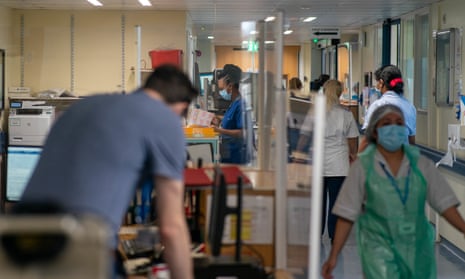UK cancer care is in crisis and patients will die because of ministers’ decision to axe a dedicated plan to tackle the disease, leading cancer experts have warned.
Waiting times for NHS cancer treatment are at a record high and it is expected there will be 2,000 extra cancer patients a week by 2040. In January, the government scrapped its longstanding cancer plan and instead merged it into a wider “major conditions strategy” that also covers a range of other major diseases.
In a report published on Wednesday in the Lancet Oncology, 12 cancer experts said the decision could cause more people to die.
Prof Pat Price, an oncologist and visiting professor at Imperial College London and joint senior author of the report, said: “The dangerous reality is that cancer care in this country is fast becoming a monumental crisis and there appears to be no realistic plan. A cancer plan is not just a strategy, it is a lifeline for the one in two of us that will get cancer.”
Mark Lawler, a professor of digital health at Queen’s University Belfast, the chair of the International Cancer Benchmarking Partnership and a co-author of the paper, said: “Getting rid of a dedicated cancer strategy will cost lives. Abandoning a dedicated national cancer control plan in favour of a major conditions strategy is an incomprehensible decision not in the best interests of people with cancer.”
The report cites recent research showing that dedicated cancer policies are associated with superior five-year survival outcomes.
Denmark, which 15 years ago was at the bottom of the cancer league table with the UK, has made cancer a health priority. The implementation of its cancer plan has led to among the highest improvements in five-year survival for six of seven cancers analysed.
Ireland has also seen an acceleration in survival for lung, pancreas, oesophageal and rectal cancer, again reflecting dedicated funding and prioritisation of cancer through its national cancer control plan.
Northern Ireland has fallen significantly behind, as has Wales, while for England there has been lower than expected improvement in colorectal and ovarian cancer.
The authors also castigate the decision to scrap the National Cancer Research Institute, which they say will have a detrimental impact on patients.
Recent international research found that people treated in research active hospitals can have up to 15% better outcomes than those who are not. “Cancer research is a necessity for delivering 21st-century cancer care, not a luxury,” Lawler said.
Frustrated at the lack of action, the experts have drawn up their own 10-point cancer plan as part of the report. “It beggars belief that clinicians are finding themselves having to produce one instead of the government,” Price said.
In addition to a “properly resourced” UK-wide national cancer control plan and the reinstatement and strengthening of the National Cancer Research Institute, the authors propose enhanced screening programmes, more action to tackle alcohol consumption, tobacco and obesity, a focus on the 62-day cancer target, the integration of hospice care within the NHS and much more investment in equipment and infrastructure.
“There is a massive crisis of out-of-date cancer treatment equipment in areas like radiotherapy,” said Price. The NHS “will never get on top of record cancer treatment waiting times” without investment in people and newer treatment machines, she added.
Prof Richard Sullivan, a joint senior author and director of the Institute of Cancer Policy at King’s College London, said: “The failure to deliver specific and properly resourced cancer plans with a research agenda that is fit for purpose is also leading to widening patient inequalities, healthcare staff burnout and poor outcomes. All the ingredients are there to address these issues. But we need political will.”
A Department of Health and Social Care spokesperson said: “Cancer is being diagnosed at an earlier stage more often with survival rates improving across almost all types of cancer and the NHS has seen and treated record numbers of cancer patients over the last two years.”










